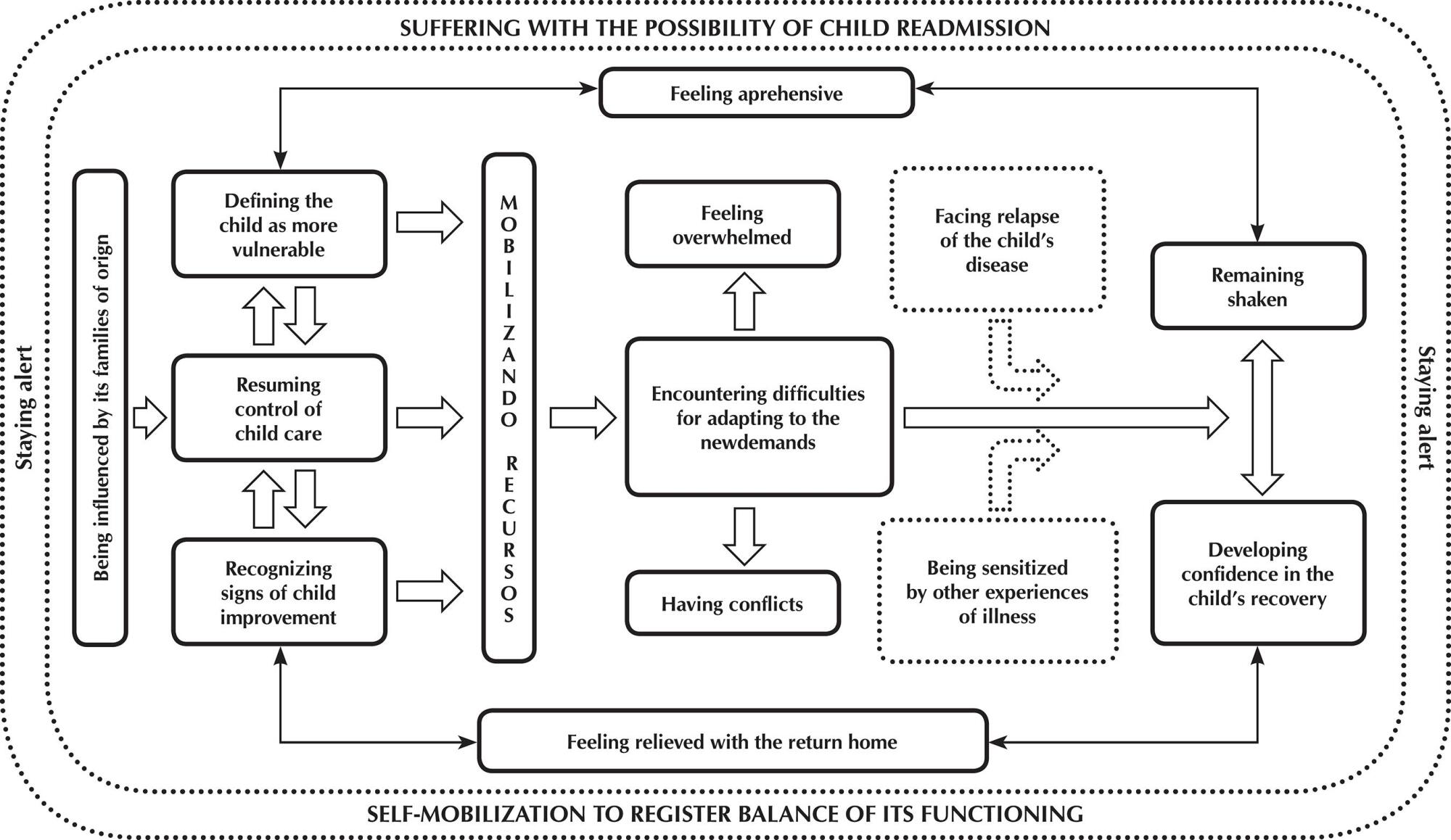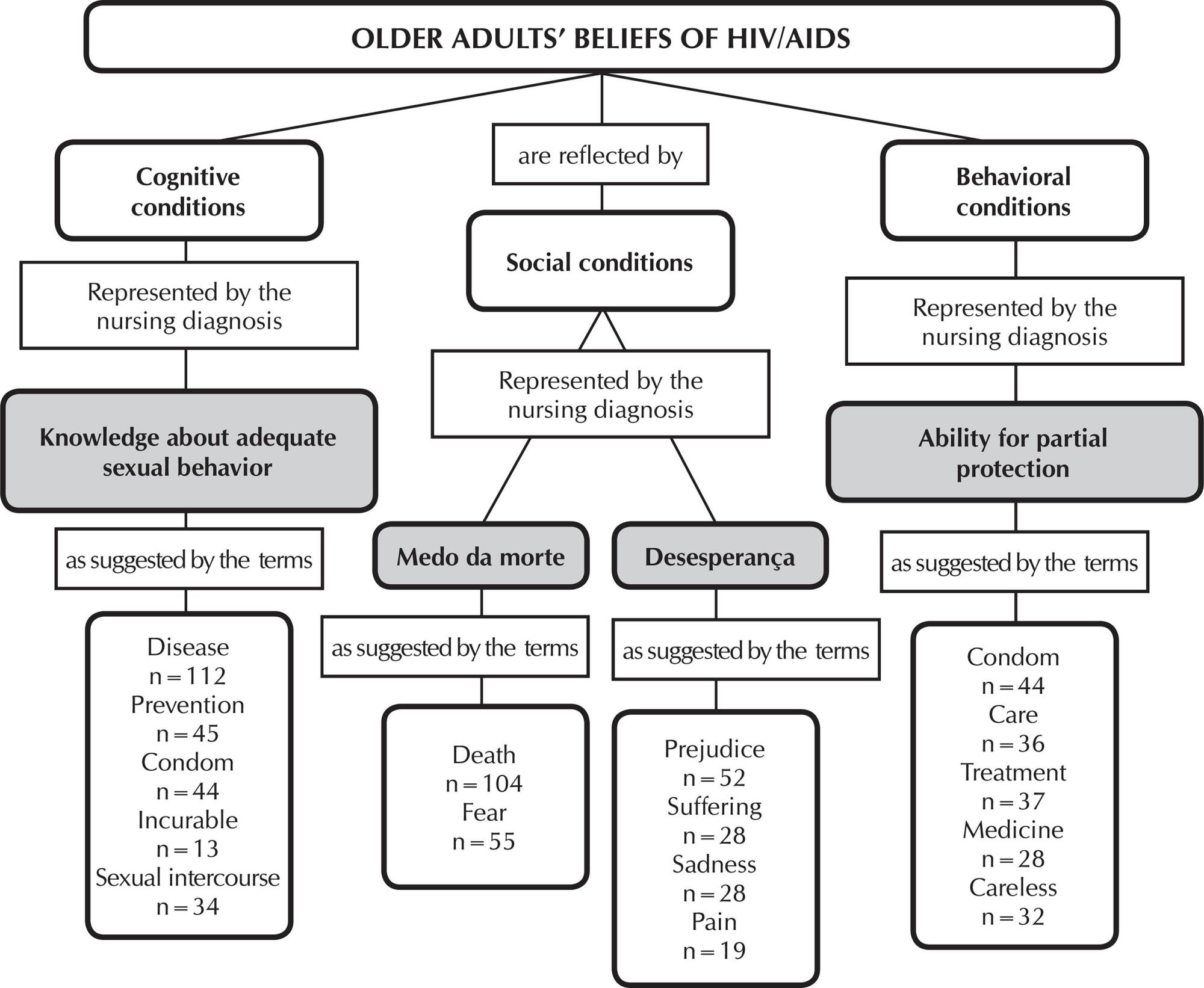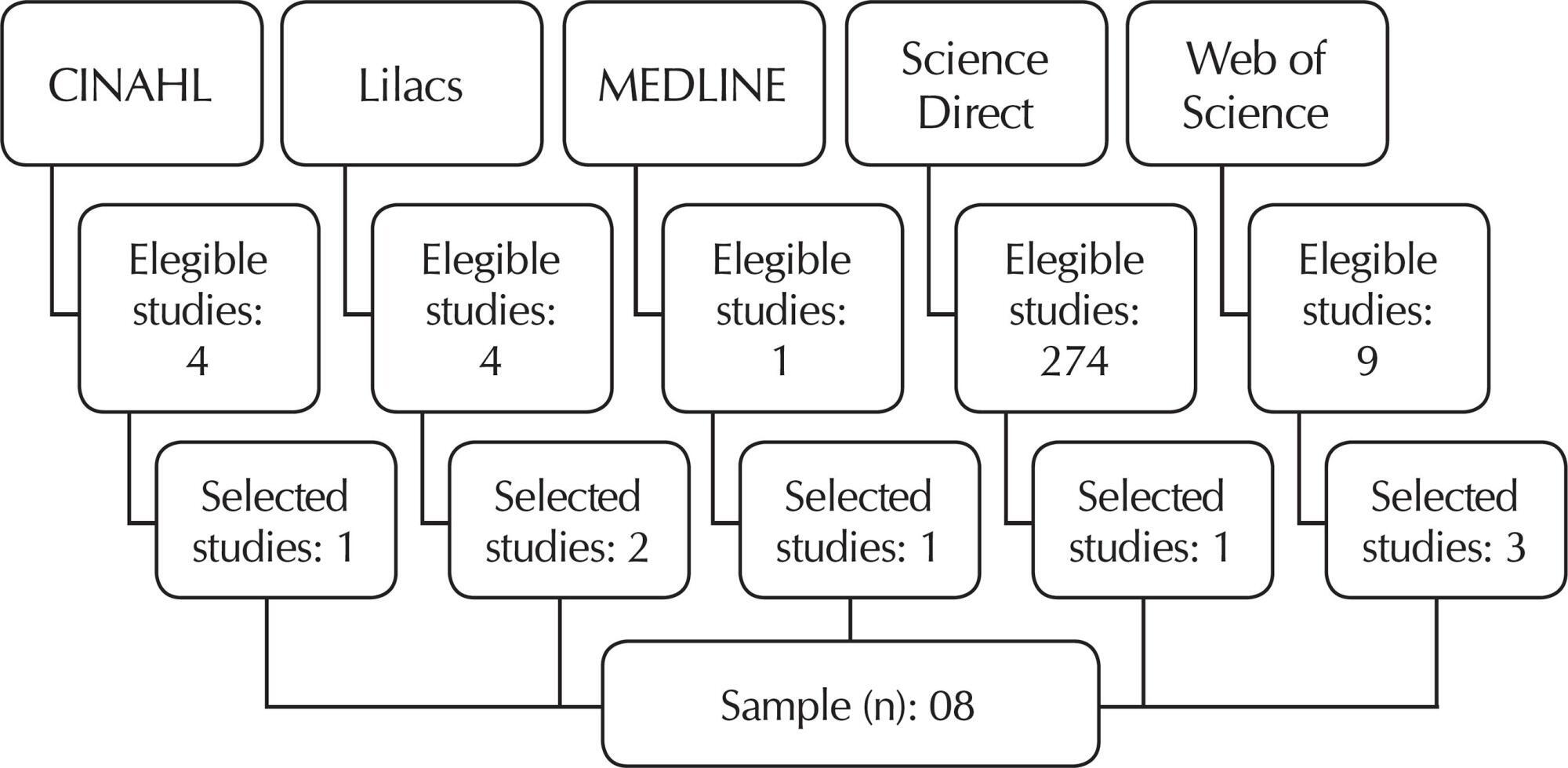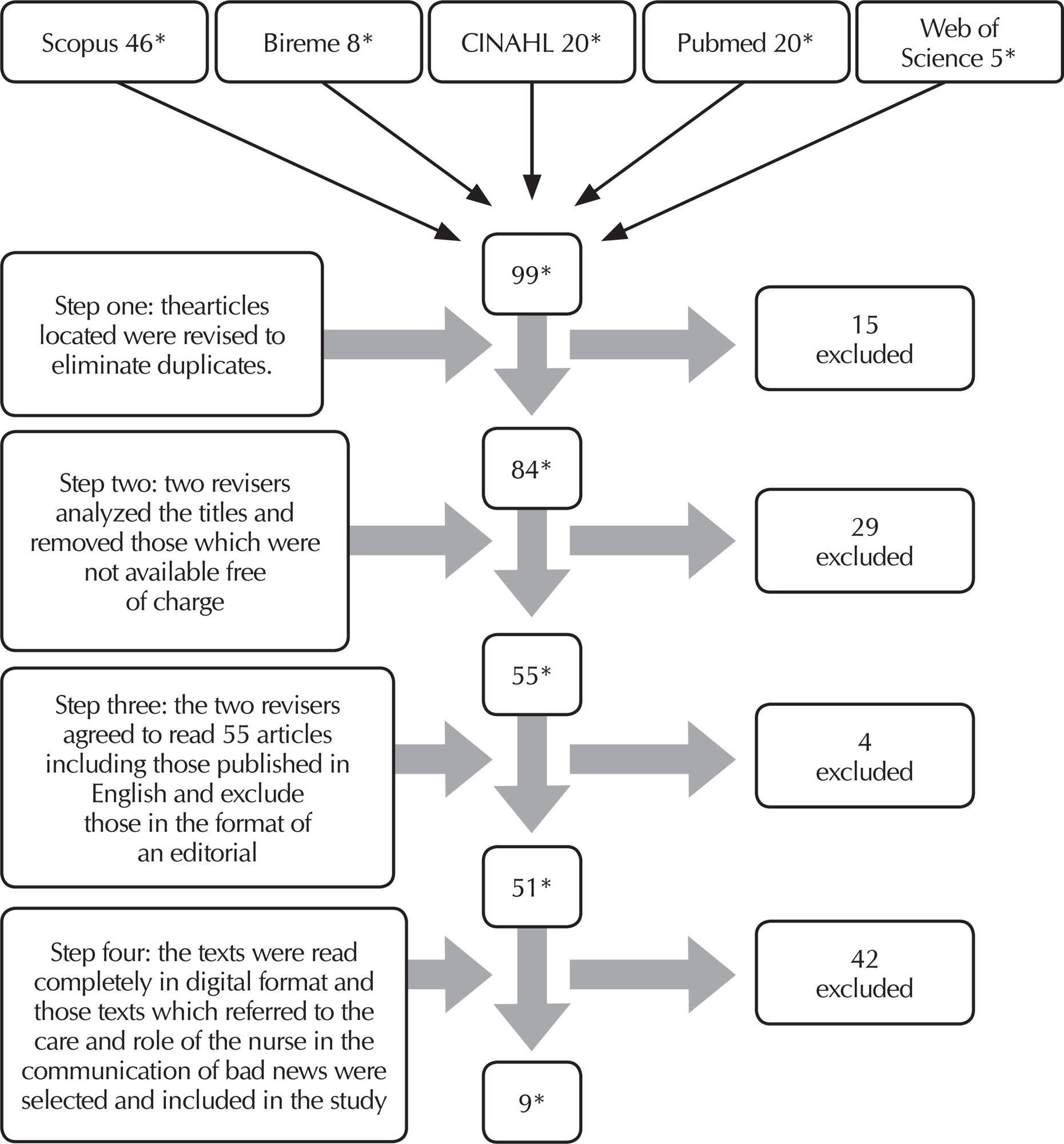-
ORIGINAL ARTICLE12-13-2024
Nurses’ experience regarding patient safety in mobile pre-hospital care
Revista Brasileira de Enfermagem. 2024;77(5):e20230529
Abstract
ORIGINAL ARTICLENurses’ experience regarding patient safety in mobile pre-hospital care
Revista Brasileira de Enfermagem. 2024;77(5):e20230529
DOI 10.1590/0034-7167-2023-0529
Views0See moreABSTRACT
Objectives:
to understand nurses’ experience regarding patient safety in mobile pre-hospital care.
Method:
a qualitative, exploratory and descriptive study, conducted with nurses active in mobile pre-hospital care services. Semi-structured interviews were conducted, audio-graved and submitted to Bardin’s content analysis.
Results:
from four thematic categories established, nurses reported the care and management skills necessary to work in this service. They demonstrated a commitment to ensuring safe care for patients, staff and spectators. They highlighted the actions taken to prevent and mitigate incidents. However, they based their experiences on practice protocols and individual actions, expressing the need to improve knowledge about patient safety.
Final Considerations:
mobile pre-hospital care nurses’ experience in relation to patient safety was limited, suggesting the need for training on the subject, alignment of work processes and implementation of strategies, aiming to guarantee safe care.
-
ORIGINAL ARTICLE12-13-2024
Repercussions of the pandemic on tuberculosis control actions from the perspective of health professionals
Revista Brasileira de Enfermagem. 2024;77(5):e20230477
Abstract
ORIGINAL ARTICLERepercussions of the pandemic on tuberculosis control actions from the perspective of health professionals
Revista Brasileira de Enfermagem. 2024;77(5):e20230477
DOI 10.1590/0034-7167-2023-0477
Views0See moreABSTRACT
Objectives:
to analyze the repercussions of the COVID-19 pandemic on tuberculosis control actions from the perspective of primary health care professionals.
Methods:
this descriptive study with a qualitative approach was conducted from November 2022 to April 2023, using semi-structured interviews with 11 key informant professionals from primary health care units in a Brazilian capital. Data were organized using Atlas.ti 22.0 software and subjected to thematic-categorical content analysis.
Results:
the pandemic scenario caused alterations in the work process, necessitating abrupt adaptations, and led to detrimental impacts on the health of professionals and tuberculosis control actions, which were reduced or discontinued.
Final Considerations:
there was evident unpreparedness and a lack of resources from various governmental levels and health services to handle the public health emergency situation without severe harm to the provision of essential services.
-
Training of Brazilian indigenous nurses: between human rights, valuing diversity and inclusion
Revista Brasileira de Enfermagem. 2024;77(5):e20230430
Abstract
Training of Brazilian indigenous nurses: between human rights, valuing diversity and inclusion
Revista Brasileira de Enfermagem. 2024;77(5):e20230430
DOI 10.1590/0034-7167-2023-0430
Views0See moreABSTRACT
Objectives:
to analyze the possibilities and potential of training indigenous nurses, given the Brazilian Health System (SUS), understanding the relationships between education and health.
Methods:
theoretical-reflective study, based on scientific literature, aligned with the experience, critical thinking of its authors and the Sustainable Development Goals in Brazil.
Results:
this text articulates three axes: Potential for including indigenous students in nursing training; Paths to achieving equity through inclusion and retention policies for indigenous students at different levels; and Implications of this for the SUS and global health.
Final Considerations:
indigenous students, beneficiaries of affirmative actions, face challenges of inclusion and retention in public universities that directly impact their academic training. Added to this are the difficulties identified in basic education, professor training and implementation of permanence policies, with consequences for services and training at other levels.
-
ORIGINAL ARTICLE12-13-2024
Interobserver agreement in Reception and Risk Stratification in Obstetrics implementation
Revista Brasileira de Enfermagem. 2024;77(5):e20230361
Abstract
ORIGINAL ARTICLEInterobserver agreement in Reception and Risk Stratification in Obstetrics implementation
Revista Brasileira de Enfermagem. 2024;77(5):e20230361
DOI 10.1590/0034-7167-2023-0361
Views0See moreABSTRACT
Objectives:
to analyze interobserver agreement in the Reception and Risk Stratification in Obstetrics protocol implementation.
Methods:
a cross-sectional study carried out during Reception and Risk Stratification in Obstetrics implementation, conducted in a tertiary hospital in southern Brazil with 891 participants in January 2020. Descriptive and interobserver agreement analysis was carried out using the Kappa coefficient in the risk stratification assigned by the triage nurse and reviewed by the researcher.
Results:
around half of the calls (55.6%) were stratified as not very urgent (green), followed by urgent (yellow) (31.8%), very urgent (orange) (9.3%), not urgent (blue) (3.4%) and no emerging stratification (red). Agreement analysis of revised stratification found Kappa values of 0.20 (blue), 0.54 (green), 0.77 (yellow) and 0.80 (orange).
Conclusions:
most appointments were non-urgent. The agreement analysis between the revised and assigned risk stratification revealed greater interobserver agreement as the priority level increased.
-
ORIGINAL ARTICLE12-13-2024
Adaptation and implementation of a Nursing care protocol for children in the Amazon Region
Revista Brasileira de Enfermagem. 2024;77(5):e20230245
Abstract
ORIGINAL ARTICLEAdaptation and implementation of a Nursing care protocol for children in the Amazon Region
Revista Brasileira de Enfermagem. 2024;77(5):e20230245
DOI 10.1590/0034-7167-2023-0245
Views0See moreABSTRACT
Objectives:
to describe the process of implementing an adapted protocol for pediatric nursing care in a health unit located in a municipality in the Amazon Region.
Methods:
methodological research conducted in a basic health unit with four family health teams in the state of Rondônia, involving seven nursing professionals. Data collection occurred between October 2020 and April 2022, following the research phases: situational diagnosis, exploratory phase, protocol definition, implementation, and evaluation.
Results:
the outcome was the adaptation and implementation of a nursing care protocol for children.
Final Considerations:
the adaptation and implementation process can be an effective approach to improving care, strengthening nursing as a profession with a solid foundation in scientific and clinical evidence. This facilitates early problem identification and appropriate guidance, leading to better health outcomes for children.
-
ORIGINAL ARTICLE12-13-2024
Nurses’ experiences in caring for people with mental health problems hospitalized due to clinical comorbidities
Revista Brasileira de Enfermagem. 2024;77(5):e20230136
Abstract
ORIGINAL ARTICLENurses’ experiences in caring for people with mental health problems hospitalized due to clinical comorbidities
Revista Brasileira de Enfermagem. 2024;77(5):e20230136
DOI 10.1590/0034-7167-2023-0136
Views0See moreABSTRACT
Objectives:
to understand nurses’ experiences in caring for people with mental health problems hospitalized due to clinical comorbidities in non-psychiatric Inpatient Units.
Methods:
qualitative study, guided by Alfred Schutz’s social phenomenology. Sixteen phenomenological interviews were conducted. The content was analyzed and discussed based on the literature, through the composition of three categories of analysis.
Results:
three categories emerged in the study: Challenges in care faced by nurses; Fragmented care action; and Ideal care. The disarticulation of the clinic was revealed, as described by nurses, showing care as an action far removed from the comprehensiveness of a person. Nurses’ performance is guided predominantly by biomedical reference, disregarding appreciation of subjectivity.
Final Considerations:
it was observed that nurses attribute the responsibility for patient care to factors external to their life-world, when, in fact, these aspects should be components that help them in comprehensive care construction.
-
REVIEW11-29-2024
Assessment of knowledge in oncology about care for transgender people: a scoping review
Revista Brasileira de Enfermagem. 2024;77:e20230532
Abstract
REVIEWAssessment of knowledge in oncology about care for transgender people: a scoping review
Revista Brasileira de Enfermagem. 2024;77:e20230532
DOI 10.1590/0034-7167-2023-0532
Views0ABSTRACT
Objective:
to identify evidence available in the literature on instruments and methodologies used to assess healthcare professionals’ knowledge about cancer care for the transgender population.
Methods:
a scoping review was conducted in seven databases, including studies that answered the question: what is the healthcare professionals’ level of knowledge about cancer care for the transgender population?
Results:
forty-one articles were selected that dealt specifically with healthcare professionals’knowledge in relation to care for the LGBTQIAPN+ population, especially the transgender population. Eighteen studies assessed patients’ perceptions of professionals’knowledge, whereas other studies used their own assessment tools, considering the global context of LGBTQIAPN+ health.
Conclusions:
there is no tested and validated instrument that assesses the knowledge about the transgender population’s oncological health, highlighting the need to construct and validate an instrument focused on this population’s needs.
Keywords:Health Services for Transgender PeopleNeoplasmsOncologyProfessional TrainingTransgender PeopleSee more
-
RESEARCH01-01-2015
Social representations about religion and spirituality
Revista Brasileira de Enfermagem. 2015;68(4):609-616
Abstract
RESEARCHSocial representations about religion and spirituality
Revista Brasileira de Enfermagem. 2015;68(4):609-616
DOI 10.1590/0034-7167.2015680406i
Views0See moreABSTRACT
Objective:
to identify the social representations about the concepts of spirituality and religion of of health teachers.
Method:
exploratory and descriptive study, based on a qualitative approach. 25 subjects participated in it. The following instruments were used to collect data: questionnaire to identify the profile; questionnaire of free association, whose inducing words were religion and spirituality, and an interview based on the scale FICA (Puchalski, 2006).
Results:
the representations about religion and spirituality, for professors, are forged around the faith in God and it gives them meaning and purpose to deal with the challenges of personal and professional living.
Conclusion:
there are still barriers that need to be overcome with a view to a comprehensive care. For this, it is essential to incorporate spirituality in the process in the curricula of health courses.

-
RESEARCH01-01-2015
Prevalence and factors associated with smoking among tobacco growers in southern Brazil
Revista Brasileira de Enfermagem. 2015;68(4):603-608
Abstract
RESEARCHPrevalence and factors associated with smoking among tobacco growers in southern Brazil
Revista Brasileira de Enfermagem. 2015;68(4):603-608
DOI 10.1590/0034-7167.2015680405i
Views0See moreABSTRACT
Objective:
identify the prevalence and factors associated with smoking in tobacco growers.
Method:
descriptive, cross-sectional research. Data collection occurred in 2012 through household survey and interviews, including application of a structured instrument and scale Fargeström.
Results:
there were 100 growers included, average age of 46,9 ± 10,8 years; 90(90%) married; 72(72%) white, average family composition 3,7±1,1 people; median number of children 3(1-3), and the average study time 6±2,5. The prevalence of smoking among tobacco growers was 17%, which had less education (p=0.010) and fewer people in the household (p=0.049).
Conclusion:
the prevalence of smoking among tobacco growers was higher than the national average, but the nicotine dependence was low, which can facilitate the smoking cessation process. Highlights the need to implement a program to control smoking among tobacco growers.
-
RESEARCH01-01-2015
The family living the child recovery process after hospital discharge
Revista Brasileira de Enfermagem. 2015;68(4):594-602
Abstract
RESEARCHThe family living the child recovery process after hospital discharge
Revista Brasileira de Enfermagem. 2015;68(4):594-602
DOI 10.1590/0034-7167.2015680404i
Views1See moreABSTRACT
Objective:
to understand the meaning attributed by the family to its experience in the recovery process of a child affected by an acute disease after discharge, and to develop a theoretical model of this experience. Symbolic interactionism was adopted as a theoretical reference, and grounded theory was adopted as a methodological reference.
Method:
data were collected through interviews and participant observation with 11 families, totaling 15 interviews. A theoretical model consisting of two interactive phenomena was formulated from the analysis: Mobilizing to restore functional balance and Suffering from the possibility of a child’s readmission.
Results:
the family remains alert to identify early changes in the child’s health, in an attempt to avoid rehospitalization.
Conclusion:
the effects of the disease and hospitalization continue to manifest in family functioning, causing suffering even after the child’s discharge and recovery.

-
RESEARCH01-01-2015
Multiprofessional residency in health: a document analysis of political pedagogical projects
Revista Brasileira de Enfermagem. 2015;68(4):586-593
Abstract
RESEARCHMultiprofessional residency in health: a document analysis of political pedagogical projects
Revista Brasileira de Enfermagem. 2015;68(4):586-593
DOI 10.1590/0034-7167.2015680403i
Views0See moreABSTRACT
Objective:
To analyze MPRH political pedagogical projects (PPP) developed in the state of São Paulo and identify scenarios that are highly favorable to IPE.
Method:
This was a descriptive exploratory study conducted through document analysis.
Results:
The analysis revealed a heterogeneous scenario regarding the curricula, didactic and pedagogical organization, educational objectives, pedagogical matrices and evaluation systems employed. One of the programs was identified as providing a highly favorable setting for IPE.
Conclusion:
The analysis adequately evaluated IPE in educational settings and found a highly favorable scenario for it, identifying didactic, pedagogical, political and organizational MPRH elements.
-
RESEARCH01-01-2015
Beliefs of older adults about their vulnerability to HIV/Aids, for the construction of nursing diagnoses
Revista Brasileira de Enfermagem. 2015;68(4):579-585
Abstract
RESEARCHBeliefs of older adults about their vulnerability to HIV/Aids, for the construction of nursing diagnoses
Revista Brasileira de Enfermagem. 2015;68(4):579-585
DOI 10.1590/0034-7167.2015680402i
Views0See moreABSTRACT
Objective:
to know the beliefs of older adults about their vulnerability to HIV/Aids, and to identify nursing diagnoses.
Method:
a field research implemented in Family Health Units, in João Pessoa, Brazil. The sample included 250 older adults of both genders with data collected from April to July of 2011. A Test of Free Word Association was applied using the term HIV/Aids. A content analysis and cross-mapping of the most frequent terms with the International Classification for Nursing Practice, 2011 were performed.
Results:
202 terms were identified in terms, with an overall frequency of 1156. Of the 202 terms, 16 were more frequent and were used to construct the nursing diagnoses. The diagnoses identified were knowledge about appropriate sexual behavior, ability for partial protection, fear of death and hopelessness.
Conclusion:
understanding these beliefs drew from knowledge about factors related to, vulnerability to HIV/Aids aimed at planning health care actions for this population segment.

-
LETTER TO THE EDITOR01-01-2015
Considerations about the manuscript published
Revista Brasileira de Enfermagem. 2015;68(4):577-577
Abstract
LETTER TO THE EDITORConsiderations about the manuscript published
Revista Brasileira de Enfermagem. 2015;68(4):577-577
DOI 10.1590/0034-7167.20156804c
Views0Re: Chinese auriculotherapy to improve quality of life of nursing team To the Editor,[…]See more -
EDITORIAL01-01-2015
Research in nursing and new pathways based on SENPE
Revista Brasileira de Enfermagem. 2015;68(4):571-572
Abstract
EDITORIALResearch in nursing and new pathways based on SENPE
Revista Brasileira de Enfermagem. 2015;68(4):571-572
DOI 10.1590/0034-7167.2015680401i
Views1Almost half a century after the beginning of nursing research in Brazil, there is still a need for investment before it can be considered consolidated. The truth of this statement can be seen in the national seminars that discuss research in the field through 17 events that present results and participation of nursing researchers and […]See more
-
REFLECTION01-01-2017
Nursing supervision for care comprehensiveness
Revista Brasileira de Enfermagem. 2017;70(5):1106-1111
Abstract
REFLECTIONNursing supervision for care comprehensiveness
Revista Brasileira de Enfermagem. 2017;70(5):1106-1111
DOI 10.1590/0034-7167-2016-0491
Views0See moreABSTRACT
Objective:
To reflect on nursing supervision as a management tool for care comprehensiveness by nurses, considering its potential and limits in the current scenario.
Method:
A reflective study based on discourse about nursing supervision, presenting theoretical and practical concepts and approaches.
Results:
Limits on the exercise of supervision are related to the organization of healthcare services based on the functional and clinical model of care, in addition to possible gaps in the nurse training process and work overload. Regarding the potential, researchers emphasize that supervision is a tool for coordinating care and management actions, which may favor care comprehensiveness, and stimulate positive attitudes toward cooperation and contribution within teams, co-responsibility, and educational development at work.
Final considerations:
Nursing supervision may help enhance care comprehensiveness by implying continuous reflection on including the dynamics of the healthcare work process and user needs in care networks.
-
REVIEW01-01-2017
Nursing knowledge and practices regarding subcutaneous fluid administration
Revista Brasileira de Enfermagem. 2017;70(5):1096-1105
Abstract
REVIEWNursing knowledge and practices regarding subcutaneous fluid administration
Revista Brasileira de Enfermagem. 2017;70(5):1096-1105
DOI 10.1590/0034-7167-2016-0424
Views0See moreABSTRACT
Objective:
To describe the evidence in the literature regarding the knowledge and practices of the nursing team about subcutaneous administration of drugs and fluids in adults.
Method:
Integrative review of the literature using the descriptors “nursing”, “hypodermoclysis”, “drug administration routes”, “adult health,” and “knowledge,” in English, Spanish, and Portuguese, with no publication deadline. Of the 569 articles found, eight made up the sample.
Results:
A predominance of international journals (75%) with more than five years of publication (62.5%). The analysis of the methodological characteristics showed a predominance of literature reviews (25%), quantitative studies (62.5%), cross-sectional studies (50%), and non-experimental studies (50%).
Conclusion:
Although it is an old technique with proven efficacy, hypodermoclysis is still little used, a puzzling fact due to its advantages and indications for any age.

-
REVIEW01-01-2017
Communicating bad news: an integrative review of the nursing literature
Revista Brasileira de Enfermagem. 2017;70(5):1089-1095
Abstract
REVIEWCommunicating bad news: an integrative review of the nursing literature
Revista Brasileira de Enfermagem. 2017;70(5):1089-1095
DOI 10.1590/0034-7167-2016-0143
Views0See moreABSTRACT
Objectives:
describe how the process of breaking bad news is established and identify how nurses approach the task of giving bad news.
Method:
integrative review of the literature for articles in Portuguese and English published between 1993-2014, in the databases: Bireme, PubMed, Scopus, Web of Science, CINAHL and Embase. Nine articles were included using the selection flow chart. A digital form was completed for each article according to the Consolidated Criteria for Reporting Qualitative Research checklist and the level of scientific evidence was determined.
Results:
Of the 99 articles in identified, nine were included after applying the selection flowchart.
Discussion:
breaking bad news is frequent in the area of oncology and palliative care, with a strong cultural influence on the autonomy of nurses in this process.
Conclusion:
the approach and skills of the nurse during this task influences the patient’s reaction to the message. The theme is scarce in the literature and merits further investigation.

-
REVIEW01-01-2017
Patient safety and nursing: interface with stress and Burnout Syndrome
Revista Brasileira de Enfermagem. 2017;70(5):1083-1088
Abstract
REVIEWPatient safety and nursing: interface with stress and Burnout Syndrome
Revista Brasileira de Enfermagem. 2017;70(5):1083-1088
DOI 10.1590/0034-7167-2016-0194
Views0See moreABSTRACT
Objective:
To analyze studies on stress, Burnout Syndrome, and patient safety in the scope of nursing care in the hospital environment.
Method:
This was an integrative literature review. Data collection was performed in February 2016 in the following databases: Medical Literature Analysis and Retrieval System Online – PubMed/MEDLINE, Latin American and Caribbean Literature in Health Sciences – LILACS.
Results:
Ten scientific productions were selected, which listed that factors contributing to stress and Burnout Syndrome of nursing professionals are the work environment as a source of stress, and excessive workload as a source of failures.
Conclusion:
The analysis found that the stress and Burnout Syndrome experienced by these professionals lead to greater vulnerability and development of unsafe care, and factors such as lack of organizational support can contribute to prevent these failures.

-
RESEARCH01-01-2017
Associative organization of nursing: struggles for the social recognition of the profession (1943-1946)
Revista Brasileira de Enfermagem. 2017;70(5):1075-1082
Abstract
RESEARCHAssociative organization of nursing: struggles for the social recognition of the profession (1943-1946)
Revista Brasileira de Enfermagem. 2017;70(5):1075-1082
DOI 10.1590/0034-7167-2017-0186
Views0See moreABSTRACT
Objective:
To describe the circumstances that determine the creation of the Brazilian Association of Graduate Nurses of the Federal District Section and analyze its implications for the reorganization of the field of nursing.
Method:
Qualitative, socio-historical, documentary study. The analysis generated the following category: Creation of a new group to guarantee unity: Brazilian Association of Graduate Nurses in the Federal District Section.
Results:
The economic crisis resulting from the Second World War, the creation of the Paulista Association of Graduate Nurses and the increase in the number of Schools of Nursing in the country were decisive for the Brazilian Association of Graduate Nurses to reformulate its statute as to guarantee its unit.
Final considerations:
The creation of the Federal District Section consisted of one of the strategies of the Association to reorganize the field of nursing, in order to ensure the recognition of the profession by the society.
-
RESEARCH01-01-2017
University management: contributions for nurses who are faculty members and managers
Revista Brasileira de Enfermagem. 2017;70(5):1069-1074
Abstract
RESEARCHUniversity management: contributions for nurses who are faculty members and managers
Revista Brasileira de Enfermagem. 2017;70(5):1069-1074
DOI 10.1590/0034-7167-2017-0068
Views0See moreABSTRACT
Objective:
To comprehend how university management contributes on the performance of nurses who are professors and managers in a public university.
Method:
Qualitative research anchored on the Grounded Theory. The setting to collect the data was a public university in south Brazil and it happened between May and September of 2016. A total of 19 nurses took part in the study, all of them also faculty members and managers that were divided in two sample groups.
Results:
Two subcategories were created: the comprehension that university management improves the faculty performance; obtaining a wider view of the university.
Final considerations:
The contributions of university management for faculty nurses who are managers are mainly on the personal and professional satisfaction through the production and dissemination of knowledge, reflecting positively on the refinement of the teaching competences to train Nurses with knowledge, technical skills and cognitive abilities to answer society’s needs.
-
RESEARCH01-01-2017
Profile of Brazilian workers victims of occupational accidents with biological fluids
Revista Brasileira de Enfermagem. 2017;70(5):1061-1068
Abstract
RESEARCHProfile of Brazilian workers victims of occupational accidents with biological fluids
Revista Brasileira de Enfermagem. 2017;70(5):1061-1068
DOI 10.1590/0034-7167-2016-0482
Views0ABSTRACT
Objective:
To characterize the Brazilian workers victims of occupational accidents with biological fluids.
Method:
Epidemiological and descriptive research, in which 284,877 notifications of the Notifiable Diseases Information System were analyzed between 2007 and 2014. We used Stata 13 for data analysis.
Results:
The highest incidence density occurred in females with 0.8 cases per 1,000 workers/year (n = 222,042, 77.9%); in the age group of 20 to 24 years old, with 0.6 cases per 1,000 workers/year (n = 64,221, 23.3%); with some high school and some college, with 0.6 cases per 1,000 workers/year (n = 141,275, 49.6%). We found that these accidents occurred among 23 occupational subgroups. For the most part, the workers had an employment relationship and had issued the Occupational Accident Notification.
Conclusion:
It is necessary to rethink the measures of orientation to workers regarding the risks and relative prophylaxis for these accidents, with the aim of reducing them.
Keywords:Categories of WorkersExposure to Biological AgentsInformation SystemsOccupational AccidentsOccupational Health NursingSee more -
RESEARCH01-01-2017
Developing skills learning in obstetric nursing: approaches between theory and practice
Revista Brasileira de Enfermagem. 2017;70(5):1054-1060
Abstract
RESEARCHDeveloping skills learning in obstetric nursing: approaches between theory and practice
Revista Brasileira de Enfermagem. 2017;70(5):1054-1060
DOI 10.1590/0034-7167-2016-0665
Views0See moreABSTRACT
Objective:
To analyze the development of professional skills in an obstetric nursing graduate course.
Method:
Qualitative research, applying semi-structured interviews with 11 students in the obstetric nursing specialization at the State University of Ceará. Data was submitted to thematic review.
Results:
According to the subjects, the course offers the development of skills to strengthen and expand the range of activities in obstetric nursing. Despite relying on previous knowledge and experience acquired by the students, there is a gap between the content taught and internship practice, presented as challenges and difficulties faced by the students. The findings suggest a need for curricular revision, incorporating active teaching-learning methodologies, to overcome the disjunction between theory and practice.
Final considerations:
Students are part of a corpus that is potentially implicated in the construction and transformation of thoughts and values set forth by educational and health institutions, and it is necessary to make changes in political and social organizations, with a focus on providing comprehensive and egalitarian care to the population.
Search
Search in:
Nuvem de Tags
Aged (144) Atenção Primária à Saúde (239) COVID-19 (104) Cuidados de Enfermagem (269) Educação em Enfermagem (151) Educação em Saúde (139) Enfermagem (930) Estudos de Validação (131) Health Education (144) Idoso (208) Mental Health (149) Nursing (987) Nursing Care (306) Patient Safety (151) Primary Health Care (284) Qualidade de Vida (104) Quality of Life (106) Saúde Mental (145) Segurança do Paciente (150) Validation Studies (108)



